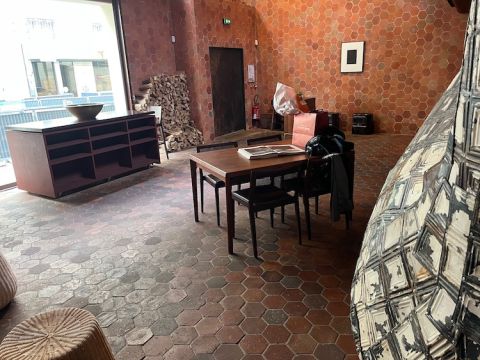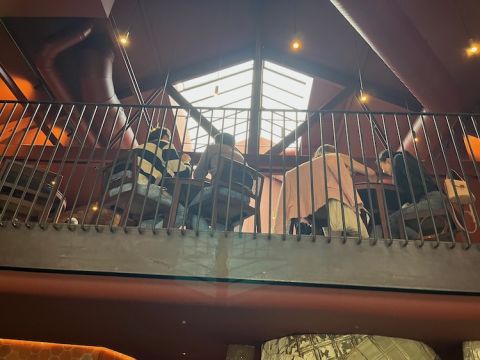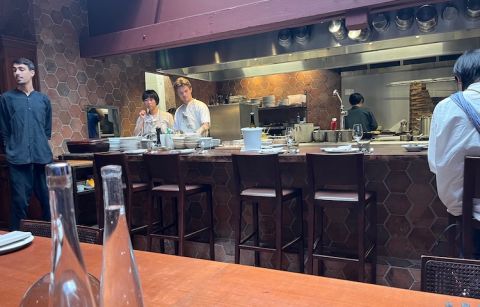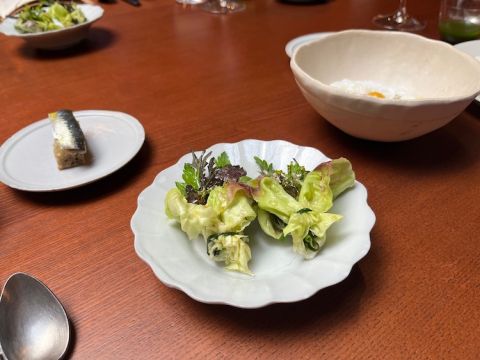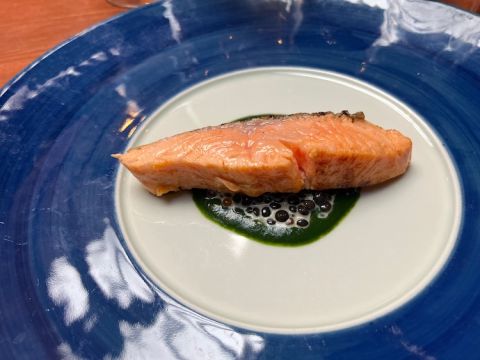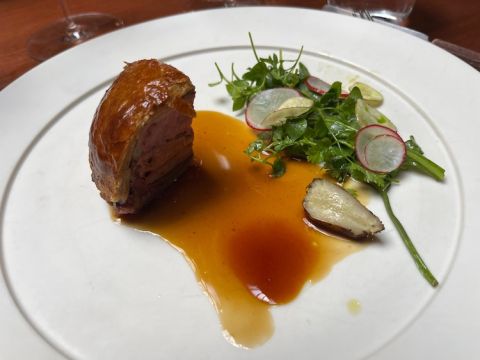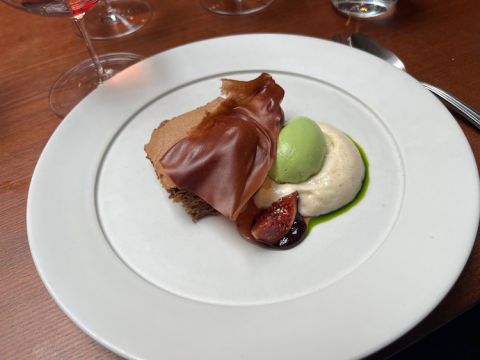Maison Sota – spacious and gracious
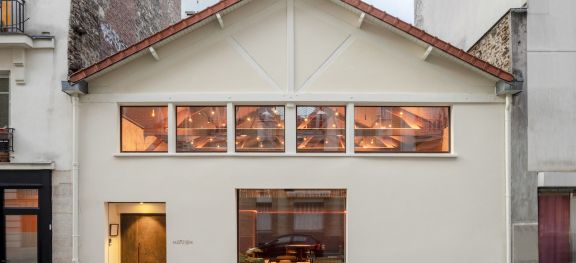
Nick describes the ideal Saturday morning in Paris, which of course includes a great restaurant discovery.
It began with breakfast outside in the sunshine on the corner of the rue Jean-Jacques Rousseau almost next to the circular old Bourse de Commerce that now houses the Pinault Collection, assembled by the family that owns Artémis Domaines, Château Latour and all that. We were on the terrace of Nelson’s, a strangely named large corner café that serves pretty good coffee whose staff the day before had even warmed up their agreeably elastic little buttery croissants for us. On our return visit, they did not but the warmth of the sunshine almost made up for this omission.
There followed a 25-minute walk to the rue Dupetit-Thouars in the 3rd arrondissement on the advice of David Lebovitz, who was a pastry chef at Chez Panisse in Berkeley for 15 years. Twenty years ago Lebovitz moved to Paris, taking with him his culinary skills and a heightened love of baking and sweet things. Today he channels these into a blog which I invariably consult before heading off to La Belle France. It was he who recommended the baker Christophe Louie, who is obsessed with panettone.
Outside Pâtissier Café Louie were a few tables cheek by jowl in typical Parisian fashion, all in full sunshine and all occupied when I arrived. I checked out the interior, which is again narrow, but on both sides the shelves are packed with baked goods: panettones, boxed and ready to be taken away; an equal number of his sourdough loaves, carefully divided into those bien cuit and those less well cooked; his interpretation of chocolate croissants; and plates of panettone already cut for customers of his café.
I walked for a further five minutes around the quiet streets beyond the café before returning as a couple vacated a table and I could sit down. I ordered a café au lait and a slice of panettone, which was absolutely delicious: light and full of dried fruit, with a lot of lemon peel. I then bought a brioche and a loaf of bien cuit sourdough with a crust that any neophyte baker could only dream of for our return to London and paid my bill of €25 before going into the flower shop along the street, Art & Nature, and spending twice as much again on some lovely flowers for the Parisian friend we were due to meet for lunch.
The restaurant for lunch had been chosen by her son, who also joined us and is co-owner of Bacchus et Ariane, a cavernous wine shop in the St-Germain market. I played no part in his choice but would very happily return to Maison Sota for its food, its wine, the immaculate service, but above all for the simple fact that it is unlike almost any other restaurant in this crowded city.
It is an indisputable fact of Parisian life that everyone is crowded together: on the pavements; in hotel bedrooms; and especially in cafes, bars and restaurants. Tables are so close in all but the most expensive restaurants that I have sometimes felt that the salt and pepper on the next table were actually ours. There is rarely room for a wine bottle, let alone a decanter, and certainly there is very little possibility of a private conversation.
Maison Sota is the very opposite of most Parisian restaurants, although it hides this particular charm extremely well. From the outside, 3 rue St-Hubert in the Oberkampf district in the 11th arrondissement looks like a private residence, perhaps the home of an architect or an artist. The frontage, shown in the main image above, is solid with just a door to the left. The street is on the seedy side, with roadworks on both pavements last weekend. The outside offers no clue as to the charms that lie within.
These become obvious once the door opens and reveals an unusually and extremely spacious ground floor that is by and large empty but for one or two carefully chosen artworks. Lavatories, both Japanese Toto, are off to the right. There is a pile of logs ready for their wood-burning oven upstairs (NB no pizza!), and there is a reception desk manned by a smiling waitress who led us upstairs to where the action is.
This is also where the light is. Under a glazed roof is the restaurant. Along the far wall is an open kitchen, shown below, where a barely visible Sota Atsumi was working away on an open grill with trays of pithiviers of duck and foie gras, the main course for lunch that day. To the right is the wood-burning oven in front of which a Japanese chef was busy slicing mushrooms for the second course – seasonal mushrooms topped with egg yolk – and cooking the sliced mushrooms on a large tray. In front of him were a number of chefs, initially quite quiet, but soon to be working at a far faster tempo. (We arrived at 12.30 pm.)
In front of these chefs is a counter with places for six customers. In front of them is an enormous, handsome table, just visible above, that can seat about 20 and it was to the centre four seats that we were shown. There was a party of three to our right, a party of four some way to our left, and beyond them a further four. But sensitively, there was a space on either side of us. Quite un-Parisian.
Behind us were a further half-dozen tables that could seat twos and fours. We were pleased to see the arrival of Marco Pellatier, chef-patron of Vantre, a wine-minded restaurant we both like. We must be in the right place, we thought.
A waiter arrived, asked us the inevitable ‘any allergies?’ question, and handed us each an elegantly printed menu listing six courses – which would normally make our hearts sink, but these were all very small, efficiently served portions. It opened with an understatement, however. Described as ‘amuses bouche’, this course comprised three very appetising little dishes: a slice of tangy sardine on top quality bread; a foamy creation based on Turkish yoghurt; and, most elegant of all, the bouquet of salad shown above to be eaten with one’s hands. The meal was off to a very good start.
But then with the first course, it stumbled a little. There was no question about the freshness and quality of the tuna but despite the rhubarb sauce underneath, the dish seemed to lack acidity and balance. High standards were regained, however, with the next two courses. There was a generosity in the volume of mushrooms served, particularly the thick cep in the centre of the dish, and in the composition of grilled trout. Under the trout, shown above, was a particularly clever sauce, a mixture of black lentils and pink trout roe enhanced by the addition of a spicy pil pil sauce.
The main course is often telling in such menus, sometimes simply too large or too heavy. Here it was extremely well judged. Each of us was served a quarter of a pithivier with its lovely pastry and sautéed Jerusalem artichoke in a rich reduction alongside a very well-dressed salad that included slices of radish. The dessert, a deliciously creamy chocolate cake enlivened with a scoop of basil ice cream, was a fitting finale. As was an espresso and a bill of €424 for the four of us, including service.
The service here, and in fact at all our meals over our three days in Paris, was extremely friendly and professional – the antithesis of the image widely portrayed of hospitality in Paris. The wines here were also interesting. We ordered a bottle of Dom de la Renardière, Les Terrasses 2020 Arbois-Pupillin (€62) as well as a glass each of Rivella Serafino Langhe Nebbiolo 2021 (€11) which we enjoyed with the pithiviers. Our waiter had earlier treated us each to a taste of the interestingly oxidative Barbe Jaune Gewurztraminer from Olivier Carl in Alsace.
The man behind Maison Sota is Sota Atsumi. Born in Osaka and arrived in Paris in 2005, he trained under Joël Robuchon and used to cook at Clown Bar. His opening of this restaurant was delayed by both COVID and building difficulties but, as an extremely satisfied customer, I have to say that it has been well worth the wait. Great food, lovely service and fascinating wines – and above all that rarest commodity in this crowded city – space!
Le Nelson’s 16 rue Conquillère, 75001 Paris; tel: +33 1 42 36 74 24
Patissier Café Louie 12 rue Dupetit-Thouars, 75003 Paris. Closed Sunday and Monday.
Maison Sota 3 rue St-Hubert, 75011 Paris; tel: +33 1 43 38 61 95. Closed Monday and Tuesday.
Photo of Maison Sota at top courtesy 11.45.
Become a member to view this article and thousands more!
- 15,407 featured articles
- 274,946 wine reviews
- Maps from The World Atlas of Wine, 8th edition (RRP £50)
- The Oxford Companion to Wine, 5th edition (RRP £50)
- Members’ forum
- 15,407 featured articles
- 274,946 wine reviews
- Maps from The World Atlas of Wine, 8th edition (RRP £50)
- The Oxford Companion to Wine, 5th edition (RRP £50)
- Members’ forum
- 48-hour preview of all scheduled articles
- Commercial use of our wine reviews


